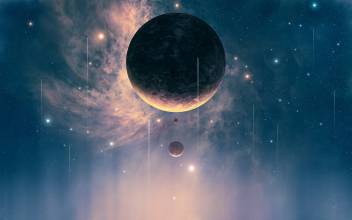(单词翻译:单击)
Supernovae occur when a giant star, one much bigger than our own Sun, collapses and then spectacularly explodes, releasing in an instant the energy of a hundred billion suns, burning for a time brighter than all the stars in its galaxy. "It's like a trillion hydrogen bombs going off at once," says Evans. If a supernova explosion happened within five hundred light-years of us, we would be goners, according to Evans—"it would wreck the show," as he cheerfully puts it.
当一颗巨大的恒星--一颗比我们的太阳还大的恒星--坍缩的时候,它接着会壮观地爆炸,刹那间释放出1000亿颗太阳的能量,一时之间比自己星系里所有的恒星的亮度加起来还要明亮。于是,一颗超新星诞生了。"这景象犹如突然之间引爆了1万亿枚氢弹。"埃文斯说。他还说,要是超新星爆炸发生在离我们只有500光年远的地方,我们就会完蛋--"彻底把锅砸了。"他乐呵呵地说。

But the universe is vast, and supernovae are normally much too far away to harm us. In fact, most are so unimaginably distant that their light reaches us as no more than the faintest twinkle. For the month or so that they are visible, all that distinguishes them from the other stars in the sky is that they occupy a point of space that wasn't filled before. It is these anomalous, very occasional pricks in the crowded dome of the night sky that the Reverend Evans finds.
但是,宇宙是浩瀚的,超新星通常离我们很远很远,不会对我们造成伤害。事实上,大多数远得难以想像,它们的光传到我们这里时不过是淡淡的一闪。有一个月左右的时间,它们可以看得见。它们与天空里别的恒星的惟一不同之处是,它们占领了一点儿以前空无一物的空间。埃文斯在夜间满天星斗的苍穹里寻找的,就是这种很不寻常、非常偶然发生的闪光。
To understand what a feat this is, imagine a standard dining room table covered in a black tablecloth and someone throwing a handful of salt across it. The scattered grains can be thought of as a galaxy. Now imagine fifteen hundred more tables like the first one—enough to fill a Wal-Mart parking lot, say, or to make a single line two miles long—each with a random array of salt across it. Now add one grain of salt to any table and let Bob Evans walk among them. At a glance he will spot it. That grain of salt is the supernova.
为了理解这是一种多么高超的本事,我们来想像一下,在一张标准的餐桌上铺一块黑桌布,然后撒上一把盐。我们把撒开的盐粒比做一个星系。现在,我们来想像一下,再增加1500张这样的餐桌--足以形成3公里长的一条直线--每一张餐桌上都随意撒上一把盐。现在,在任意一张餐桌上再加一粒盐,让罗伯特·埃文斯在中间行走。他一眼就看到了那粒盐。那粒盐就是超新星。


